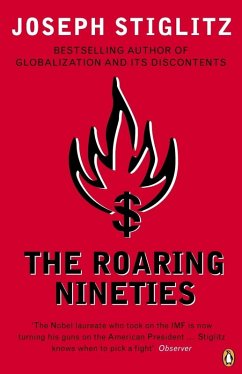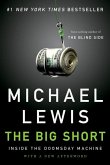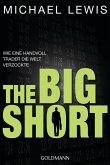Dieser Download kann aus rechtlichen Gründen nur mit Rechnungsadresse in A, B, BG, CY, CZ, D, DK, EW, E, FIN, F, GR, HR, H, IRL, I, LT, L, LR, M, NL, PL, P, R, S, SLO, SK ausgeliefert werden.

Das Beste ist der Titel: Die "Roaring Nineties" beschreiben das Gefühl der späten neunziger Jahre. Haussierende Börsen und robustes Wachstum ließen die Wellen des Konjunkturzyklus vergessen. Die schöne neue Welt des Internets versprach jedem, er könne ein erfolgreicher Unternehmer werden, das Kapital werde ihm nachgeschmissen, und ein Arbeitseinkommen sei unnötig. Eine ganze Generation von Berufsanfängern erlebte die Wirtschaftswelt von ihrer luxuriös-blendenden Seite. Kultur und Kapital fusionierten, heraus kam ein ganz neues Lebensgefühl.
So manisch die neunziger Jahre waren, so depressiv artete der Katzenjammer danach aus. Plötzlich glauben alle wieder, die Fratze des kalten Marktes zu erkennen: Gierige Manager und anonyme Finanzmärkte haben sich gegen ehrliche Menschen und gutmeinende Politiker verschworen. Ein wenig von dieser Depression - zuzüglich einer Portion Besserwisserei - atmet auch das neue Buch des Wirtschaftsnobelpreisträgers Joseph Stiglitz. Wie ein Detektiv sucht Stiglitz die Schuldigen für Boom und Bubble. Und siehe da, die Bösewichte sind rasch gefunden: Die Wut der Deregulierung, böswillige Bilanzmanipulateure und fehlgeleitete Steuerpolitiker tragen die Hauptverantwortung. Besonders böse ist Stiglitz auf die Deregulierung: Die Privatisierung von Telekommunikation und Strom sei verantwortlich für Überinvestitionen, was letztlich zum Platzen der Spekulationsblase geführt haben. Zuviel Dynamik, zuwenig Statik. Zuviel Markt, zuwenig Staat. Stiglitz ist ein Prediger im akademischen Gewand. Doch war nicht Stiglitz selbst in den späten neunziger Jahren Chef des Wirtschaftsberaterstabs von Präsident Bill Clinton? Der Autor leugnet es nicht, verschiebt aber die Verantwortung: auf die Politik Ronald Reagans, welche die Roaring Nineties erst ausgelöst habe, und auf die Macht der Märkte, denen niemand mehr die Stirn habe bieten können.
Das ist alles ein bißchen dürftig. Zumal man von einem Nobelpreisträger eigentlich mehr erwartet hätte. Es fehlt vor allem der wirtschaftshistorische Vergleich mit früheren technischen Revolutionen (etwa der Eisenbahn). Hätte Stiglitz die damit jeweils verbundenen Produktivitäts-, also Wohlstandsgewinne gewürdigt - sein Blick auf die Roaring Nineties wäre weniger negativ ausgefallen.
ank.
Joseph E. Stiglitz: The Roaring Nineties. W.W. Norton, 25,95 Dollar.
Alle Rechte vorbehalten. © F.A.Z. GmbH, Frankfurt am Main









